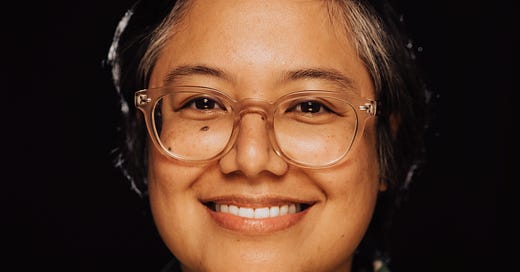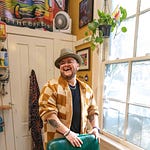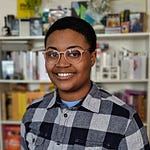TNG Worklife is a podcast and ongoing conversation about the work-life experiences of the transgender, nonbinary, and gender expansive communities.
You can find us on Apple, Spotify, Google and Instagram.
This podcast is always free, and if you enjoyed it, you can support the work by subscribing for as little as $8 a month.
About Dorothy Santos
Website: https://dorothysantos.com/
Credits
Opening music - Abstract Fashion Pop by QubeSounds
Closing music - Where the Light Is by lemonmusicstudio
Episode Transcript
[upbeat pop music plays]
[Kai Stowers]
Hi, I'm Kai Stowers, host of TNG Worklife, a podcast about the worklife experiences of people in the trans, nonbinary, and gender expansive communities. I hope you join our community by signing up at tngworklife.substack.com, which will deliver each episode, including the full transcript, right to your inbox.
In this, our season finale, I meet with Dorothy Santos, a film and digital media scholar, artist and educator. They share what it was like to grow up in an immigrant family in San Francisco and the queer and trans folks who informed who she herself could be. They share experiences of being both seen and unseen, what leaders can do better, and how she longs to be the representation she always needed.
Let's get into it.
Hi, Dorothy. Welcome. I'm so glad to have you on the podcast today.
[Dorothy Santos]
Thank you so much for having me. I feel very humbled and honored as well.
[Kai Stowers]
Yeah. I'm really looking forward to this conversation because a lot of the ways you're known in the world is for your art and for your academic work. And today we're going to have a chance to get to know you as a person as well.
[Dorothy Santos]
Yeah, I historically am not great at talking on a more personal level, But I am ready to share that story. I feel that that's very much an honor so I'm looking forward to it.
[Kai Stowers]
Yeah. And I'm really excited because we're friends, and I've gotten to know all these incredible parts of you that others are really going to appreciate getting to know and see as well.
[Dorothy Santos]
Oh yeah, no, let's go for it. Let's do it
[Kai Stowers]
Can you tell me about your background and where you grew up and some of the values and expectations you had growing up?
[Dorothy Santos]
Sure. I was born and raised in San Francisco, California to immigrant Filipino parents. And so I'm a long time, long, long time resident of the San Francisco Bay area.
A lot of people see The Bay Area broadly, but San Francisco as this safe haven for being a QT BIPOC person. And there's some pockets of San Francisco I would not go to, like the Marina. I will go on record and say that. Or even parts of Hayes Valley, even though they have amazing cafes there. But I feel grateful for having been born and raised in a place where my mom had this very prescient view of the Bay Area being a place that would be good to raise a kid.
Some of the other things that really influenced me as a kid is having queer role models, like this beautiful, gorgeous trans tita.
So tita is like auntie in Filipino culture who would cut my hair and my mom's hair in the back of this. Filipino market in Excelsior district. There's a lot of Filipino enclaves in the Bay area
And so there were a lot of little markets. This market doesn't exist anymore, but it had all the VHS tapes and even beta tapes imported from the Philippines and it's just everything all Filipino.
And then in the back, it would be someone who would rent a chair to just cut hair. And it was this beautiful Filipino trans like auntie or tita. That's the first time I realized that my mom was way more progressive than most, because I was like, Oh, she seems really different.
And then my mom said, Oh, she is very different, but she's a woman and she's a lady and she really likes her makeup and hair. And you have to respect her,
[Kai Stowers]
Yeah. And, as someone who grew up in a small town in Texas, there was no representation. Like I got to college and I was asking people what this rainbow flag was and nobody wanted to tell me cause they assumed I was straight and cisgender. So maybe you could say a bit more about going to get your hair cut,
[Dorothy Santos]
Oh, sure.
[Kai Stowers]
And what that meant for you.
[Dorothy Santos]
She was very unapologetically herself, and there's this one image in my head of when she had this all purple outfit on, and it was a deep purple.
And she had her hair in a ponytail, no hair was out of place, beautiful makeup, makeup that actually matched your skin tone, not like lightening it up cause that's a whole other Filipino thing with colorism and all that. But she just knew how to put herself together.
For me to see that was important. It made me feel, well, if she can do that, I can be who I want to be.
And I had a Tita Rosing, who's, goddess bless her soul because she's been gone for a minute, but she was the out lesbian amongst our family friends.
She dressed masculine. Granted, Tita Rosing still dressed like she was in the seventies with her bell bottoms and her polyester button ups. She still fit into all her clothes in her old age, you know, but she has short ass hair. She lived with her best friend, which was her partner, but at the time was introduced to me constantly as like, Oh, remember that Tita Roseng's friend.
And I'm like, Oh, okay. Italics, bold quotes. That's what that kind of meant. I knew it because they lived together.
[Kai Stowers]
Yeah.
[Dorothy Santos]
And I went around their house and I was like, Oh, that's their bedroom. There's one bed. Like, I know what that means. You know what I mean?
[Kai Stowers]
Yeah. Yeah.
[Dorothy Santos]
And I don't oftentimes get a chance to talk about the women and trans folks and the queer folks that actually informed my perception of how I could be in the future.
And the last person that was a role model for me, and if this doesn't tell people that I'm queer as F then, I don't know, but I deeply, deeply, deeply admired and adored and never missed any of his specials. I love Liberace.
[Kai Stowers]
Ah, okay. Yeah.
[Dorothy Santos]
I was just like, Ooh, I want the rings.
I want the cape. The piano, the piano playing is going to take me a long time, but maybe I could do that. But I could just go with the cape and the rings and the bedazzled everything.
[Kai Stowers]
Yeah.
And I can hear even now joy and excitement when you think of Liberace on stage.
[Dorothy Santos]
Absolutely. Yeah.
[Kai Stowers]
What were the expectations in your family? I'm guessing artist was not high on the list.
[Dorothy Santos]
You would be correct. My mom, she had no desire. I wouldn't even say little desire. She did not want me to be an artist. I think she always thought, Oh, this is a cute little hobby.
[Kai Stowers]
What did success look like?
[Dorothy Santos]
Go to school, get married, to a cis man, have children, and get a great job with benefits. I'll speak for myself being born and being raised in a immigrant Filipino household. I already knew my family members were suppressing themselves. Or changing their accents, being read as someone who's really trying to be American. And I grew up around that thinking, I don't want to be that. I don't want to do any of that actually.
[Kai Stowers]
Yeah. And there's something poignant about that because survival can really be attached to figuring out how to navigate a system where you're viewed as an outsider. And there's a cost to it. There's absolutely a cost to it.
[Dorothy Santos]
Yeah. So I think those are the ways that I would say that I wasn't really seen. My father passed away in 2006 and I took his passing a lot harder than I thought because we had a really tumultuous relationship and I still loved him. You can have a toxic relationship and still have love for a person.
[Kai Stowers]
Yeah. And sometimes you mourn the relationship you wish you could have had.
[Dorothy Santos]
Absolutely. Oh, a hundred thousand percent.
When he passed away, I came out to my mom and I came out to coworkers and I started really living my life the way that I wanted.
So when I was 30 and I was working at this biotech company I physically made pretty drastic changes to my appearance.
In hindsight, I am actually really proud of myself for coming out. I look at young people now and I think, my gosh, I wish I was that self aware when I was that young, but my dad was, I don't know if listeners know the show Mad Men, but I joke describing my dad as he makes Don Draper look progressive.
[Kai Stowers]
Mm hmm.
[Dorothy Santos]
My dad was very straight and very straight-edged. And he was in the military and even his conception of his own Filipinoness, I think really hindered him from accepting who he really was, because I think when he immigrated here, he really thought, okay, I'm not really Filipino, I'm American.
There's this idea that if you have stability professionally, then it could actually give you the life you want, give you the life you dreamed of, and I just never felt that way.
[Kai Stowers]
At your most expansive, what are some of the words or concepts that really feel right to you?
[Dorothy Santos]
I think to have gentle masculinity, a fierce femininity, and a really exquisite androgyny, is like, I would love to feel all of those things on any given day. One of the things that come to my mind is this concept of genderqueerness or being genderqueer. And I say that because I am also pansexual.
I've dated the rainbow I think the frustration in trying to explain that to people in my life because when I would date a cis woman, some friends would tell me things like, Oh, you're a lesbian now.
Or if I'm dating a cis man, you're straight again, or if I'm dating a trans nonbinary person or another genderqueer person, they're like, Oh, you're, you know, they wouldn't know
what to say. And I go, Oh, I see you short circuiting.
[Kai Stowers]
Yeah. And I really relate to that because I'm also queer. I've dated many different genders and I feel like we just don't have enough room in our culture. some people, yeah, they are super binary. They're like, Hey, I'm attracted to one gender and that's it. And I'm good.
And then some of us are going to be attracted to different people and different genders at different times. I think that fluidity and change is exciting and for me, it makes a lot of sense, but it is hard being on the other end of people who are like, I just don't get it.
And I'm going to have to put you in a box that I understand. Cause I just don't have other boxes.
[Dorothy Santos]
Yeah, absolutely.
[Kai Stowers]
And we actually worked at the same biotech, although we didn't know each other then, which was usually ranked pretty highly in terms of employee engagement. But I know my experience there was I needed to check my identities at the door and I need to pretend to fit in and to be straight and to be cisgender.
What were some of your experiences there?
[Dorothy Santos]
I felt that the company we work for, everybody saw that as, Oh my gosh, this is the Harvard of biotechs, you know, like this is the place you want it to be.
And then when I got there. I thought to myself, Oh, that's it. And then this isn't the greatest place on earth. This is not the Disney of biotech. You know what I mean?
Um, It's certainly wasn't the happiest, but one of the things that happened for me was I came out while I was at the biotech, and I noticed a huge shift in the way people treated me I didn't go on some office email and say, Hey everyone, I'm queer.
I didn't do that. But when I came out, I started dressing more androgynous, more masculine, and far less feminine.
One of the most visible to people was, I cut my hair extremely short for many, many years. I think one of the reasons why it was so jarring for people is because I had been so feminine and it's actually was a part of, processing my father passing away and just wanting to be myself.
[Kai Stowers]
Yeah. And I think about being like the Harvard of biotechs and it really attracted, bright competitive people, and what can happen, and I've seen this in other places, is when you have that mix of people, success or the right way to do it gets boiled down to just one thing or one way.
[Dorothy Santos]
Yes. Yes.
[Kai Stowers]
And then people who are outside of that, who can't fit in or who don't have interest in fitting in, people just don't know what to do with them.
Mm hmm. Absolutely.
[Kai Stowers]
Yeah. I remember after I came out, like some people were great. And then there was a little distance with other people that wasn't there before.
And it kind of caught me off guard.
[Dorothy Santos]
Mm hmm.
[Kai Stowers]
Because I was like, this isn't that big a deal. Is it? Is it?
No, absolutely.
[Kai Stowers]
And, where the rubber hits the road for inclusion are those day to day interactions with your peers and your direct manager. And all of us have more to learn about all the differences
[Dorothy Santos]
Yeah,
[Kai Stowers]
and when there's not even a recognition that there's more to learn, cause we're competitive here and there's one way to succeed.
It becomes an almost impossible conversation to have.
[Dorothy Santos]
Yeah.
[Kai Stowers]
So you've got this stable job. You've reached this place that your parents are like, Hey, if you reach this place, like life, it's going to be good for you. And yet, what were those things that started pointing you to this isn't for me and I want to reach for something else.
I used to joke about some of my colleagues like, Oh my God, we're all adults, but you act like you're in Mean Girls. I remember getting tattoos and very few of my coworkers had visible tattoos. Sometimes I would wear short sleeve shirts to work and someone saw my tattoos, like a manager of all people, a freaking manager said, Oh, there's no man that's going to marry you with those things.
[Kai Stowers]
Wow.
[Dorothy Santos]
And the first thing that came to my mind was like, number one, how do you know that I would even want to marry a cis man.
[Kai Stowers]
Right.
You were talking about, like how you're changing your appearance to be more in line with who you are and feel more authentic. For us, that's such a positive process of being able to step into our identities and express ourselves.
And then it gets read as something else. I mean, that comment with the tattoos. I don't personally have tattoos, but for most people, they're important and meaningful from what I understand.
[Dorothy Santos]
Absolutely.
[Kai Stowers]
And to be told you've done something that's really important and meaningful for yourself.
And as a result of that, nobody would want you.
Whose lens is that? Like you might not want to date someone with tattoos. That's fine. But don't assume that nobody else can find tattoos attractive.
[Dorothy Santos]
Oh, yeah.
I think it also reminds me of this one time. It relates to being visibly queer and Asian at another biotech that I worked for. I wasn't really close to anyone cause I just felt like, Oh my gosh, this is not the crowd that I want to be in because people didn't really care to know me.
But I needed the job.
The VP like trying to make conversation, he said, Oh, so who watched the new Ghost in the Shell with Scarlett Johansson? I said something because no one else was saying anything, and I said, Well, I don't plan on seeing that movie. Also, I think that they wrongly cast Scarlett Johansson. That role's supposed to go, at the very least, to an Asian person. Especially an Asian woman, you know? And then he looked at me and he said, they made her look Asian. Isn't that enough for you? And then everyone at the table was quiet, and I said, No, that's not enough for me.
[Kai Stowers]
Wow. Wow. Just no understanding.
and these are the people, these are the decision makers
[Dorothy Santos]
But not just that, the people that have been so negligent professionally to me have been managers and directors and VPs, not my counterparts, you know what I mean?
[Kai Stowers]
Right. Right. Well, say you were talking to leaders who are listening to this now and want to do better, what steps might they take?
[Dorothy Santos]
I think as a media scholar and as an artist consume more media, but I'm gonna step away from that. But I just needed to say that and get it out of my system. There's three things. The first is do not make assumptions. The second one is ask questions.
And the third one is please don't treat QT BIPOC, folks with disabilities, undocumented folks, don't treat them as like all of a sudden, they're an assumed teacher or guide for you.
This is an everyday practice. There are so many resources out there. There's so many ways to really educate yourself. People might think, Oh my God, but that's so hard.
I don't want to learn someone's pronouns. Well, too bad because people have been respecting your pronouns. They've called you nothing, but. So you haven't had to learn that because you've been conditioned to do that, you know what I mean?
[Kai Stowers]
And I think it's so interesting too, because we're at biotech companies with extremely smart people who are taking on complicated challenges. And then,
[Dorothy Santos]
Yeah!
[Kai Stowers]
and then for some reason this,
[Dorothy Santos]
What you just said. Why is the pronoun that difficult for you?
[Kai Stowers]
Right
[Dorothy Santos]
You don't go to the DEI workshop for three hours and say all done. I am completely conscious and la la la la. No, This is an everyday thing.
I'm really inspired by Blunt, a co-founder of Decoding Stigma and also a co-founder of Hacking Hustling.
My collaborators and I, we had a conversation with them earlier this year, and they said, we have to have different conversations around consent because every day you wake up and you're consenting to the unknown. So people tell me, well, I don't want to mess up. I don't want to say anything wrong. Too bad. You've already done that many times before.
And this is how you learn, you know what I mean?
[Kai Stowers]
Yeah, and it's so important because when we play it safe, we're not actually connecting. Leadership is connecting with other people. And if we say, I'm just going to play it safe, we're going to be running on whatever biases that we've had programmed in. And we need places where we can have those vulnerable conversations and that might not be in the workplace. That might be in leadership training. That could be in coaching. That can be in communities.
I think white people, especially, I have learned so much from being in community with other white people and talking about race. So I can say, hey, here's where I totally put my foot in it. Here's what I didn't understand. And here's the emotions I need to process. That's a good place for me to do that work so that I can come back and do better next time.
Absolutely.
[Kai Stowers]
Yeah. I feel like we could spend the rest of the podcast on what does it mean to do our own work? Right.
[Dorothy Santos]
Yeah.
I have certain privileges by being a cisgender woman. And I think everyone has to check their own assumptions before engaging with other folks.
You need to allow yourself failure.
Everyone talks about being empathetic, but the truly immersive experience of empathy is actually enacting it.
And then being able to receive it and forgiving yourself. Like trust me, I have so much that I carry About not forgiving myself for so many things. I battle with that constantly, but that really toughens you up.
It really allows you to be expansive, and there's no such thing as, getting everything perfect and right, you know?
[Kai Stowers]
Yeah. I mean, we're striving to be in relationship, not to be perfection.
Yeah. Yes. You always have those zingers. Yes,
[Kai Stowers]
All right. Well, let's shift a bit
You shared with me a while ago somebody saw you, assumed you were queer, and came up to you.
[Dorothy Santos]
Oh, I'm so happy that you remembered that. That was a really lovely day.
Yeah, I walk into this art shop because I wanted to reward myself. I wanted to get pens because I love journaling and physically writing. I did see a woman walking in after me, but I didn't pay any attention. And then she comes up to me and she says, um I'm sorry. I know this is a really weird question, but are you queer? And I said, yes. And she said, I just wanted to tell you that you reminded me of who I really am. And I wanted to thank you.
That's probably one of the most lovely idyllic situations of being seen, but also someone seeing themselves or seeing a future.
[Kai Stowers]
Yeah. I don't know how I'm going to top that. We're just going to drop the mic now,
No,
[Kai Stowers]
That interaction actually makes a lot of sense to me because I see how vibrant and alive you are. And part of that is because you've been able, and not all of us have the privilege to go after the dream job.
[Dorothy Santos]
Sometimes we need that stability. But when we are able to step into our own authenticity and our own expansiveness, whatever that means for us, I feel like that gives us so much energy and aliveness, and other people see and respond to that.
uh, yeah, I have a pretty circuitous path. I worked in biotech, I do teaching, I'm on a hiatus now, but I just finished a PhD program and yeah, I make art.
And so within a couple of years of my father passing, I started art writing and I think a lot of people introduce me as an art critic.
And I don't really like seeing myself that way, because I have this very contentious relationship with criticism. I would rather be called a cultural critic than an art critic, but it allowed me to step into a different way of voicing and expressing my opinions and perceptions of the world.
Also to be corrected. Writing really gave me an outlet to immerse myself in a field that just kind of accepted me. Trust me, the art community, the art world broadly has its own problematics like everything else and anything else. But one of the things that I didn't put together until now, until talking to you that I started writing way more when I came out.
And then it just progressed. I worked in biotech full time and I did my Master's in Visual and Critical Studies at the California College of the Arts full time. I started to triangulate myself with different communities where I could find, like minded people or people that would respectfully dissent from my view.
But, you know, teach me something
[Kai Stowers]
Yeah. I think it's so interesting that you talked about how after your father died, you were able to come out, you started writing more because we, as human beings, we can't censor one part of ourselves without censoring the rest of us.
Yes.
[Kai Stowers]
And if we want people who are passionate, who are engaged, who are creative, they need to have access to be who they are in the world.
[Dorothy Santos]
Yes.
Yeah, 100 percent 100, 000 percent
[Kai Stowers]
Yeah. Yeah. What does being an artist and a scholar mean to you? Like what are the things in this world that you get to accomplish?
[Dorothy Santos]
One of the things that was really affirming for me is that I had more opportunity to just be myself creatively and intellectually in the arts than any other place. But I also really love science. I love research. There's a type of truth seeking that can happen in what I've done.
But I want to be an artist. I need to be an artist. And that's complicated. And, even my own journeys through my own queerness the past six years, even though I'm in my mid forties, I still have questions about myself.
I always will. And I think that's something I wish people would understand that gender is so fluid, not just in one part of your life, but throughout your life,
[Kai Stowers]
Right.
Because you're growing alongside other people.
[Kai Stowers]
I think that's so cool because my first knee jerk reaction is, well, some people, it's not fluid. But then I was like, you know what? The way we understand gender in say a young girl versus a teen versus someone who is just married or parenting or is in their last days of life, what that means changes.
[Dorothy Santos]
I feel grateful for all of the trials and tribulations, even though sometimes they're so painful while you're going through them. You never know why you're going through the thing until much later on when someone needs you.
I have a ton of students, they need help. Not just with thinking conceptually about a project or what resource can I turn to?
Sometimes they want someone who will read the room.
And say, Hey, what's going on? Are you doing okay? I noticed you're not turning in your homework. What is up with that? This kind of goes back to what can leaders remember when they're talking whether it's your direct reports or your colleagues that someone is a whole person. I'm not telling people to pry and make things uncomfortable and awkward. But showing care towards someone that you understand and even if you are not the person to do it, say, I think I have a resource for you if you need it. I'm just going to put it out there.
Cause sometimes people, they won't tell you right away. The trust has to be built.
[Kai Stowers]
Yeah. do you have an example that you can share of a meaningful or transformative conversation with a student?
[Dorothy Santos]
I was a TA for another film and digital media course. And, she is an Indigenous student and I sat with her for, you know, consecutively coming to my office hours and her final project, it blew me away. She did a voiceover for one of those educational videos that talked about, here's the Native American, like the kind of 1950, like the really horrific, racist educational videos that would come out.
She decided to do a complete voiceover of the film. It was based off of our conversations and what I felt she should pull out and, maybe add more of this. I told her, I recommended you for an A because this is incredible.
She subsequently went into media, like journalism. And said to me, you were one of the TAs that cared so much about me and who I am. You sat with me and you cared. And so that's the reason why I love teaching.
My partner and I have a mutual friend, this really brilliant artist and educator, Fabiola Hanna, and she said something recently that was like, life is brutal. But it's also beautiful, you know, and it is.
[Kai Stowers]
And there's that expansiveness again.
[optimistic music plays]
[Dorothy Santos]
And there's that expansiveness and I want people to understand that I want you to have your own journey because people have asked me, how did you get to where you are you're so accomplished and it's weird because I have to step back and be proud of myself because I haven't even allowed myself to do that and I do want to be someone's queer auntie or queer fairy godparent. I want to be that for you because I felt like I always needed that.
[Kai Stowers]
Yeah. All right. Well, thank you so much. It's been incredible to be in conversation with you today.
[Dorothy Santos]
Yay. Same. Thank you.
[Kai Stowers]
Thank you so much for listening to Episode Six, the season finale of Season One of TNG Worklife, an independent podcast produced by Kai Stowers LLC. This podcast will be back in the fall with episodes about the power of community and partnership. In the meantime, this podcast is always free. And if you enjoyed it, you can support the work by subscribing at tngworklife.substack.com for as little as $8 a month.
Your generous support goes towards production costs and paying subscribers receive additional content as well as discounts on workshops and trainings that I lead. If you would like to learn more about my coaching and consulting work, you can contact me through my website, kaistowers.com.
Finally, I wish that each of you find grounding, connection, and abundance in your lives.















Share this post